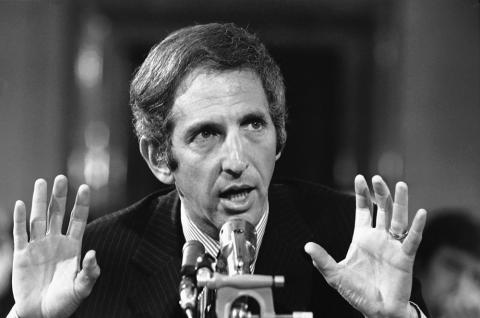Daniel Ellsberg and other luminaries send letters to judge on behalf of Hacktivist Jeremy Hammond
Daniel Ellsberg, infamous for releasing the Pentagon Papers that exposed government lies and coverups during the Vietnam War, is now publicly supporting a fellow whistleblower in trouble. Ellsberg wrote a letter of support for “hackivist” Jeremy Hammond who is facing 10 years in prison for hacking into a corporation’s private security and public safety servers and releasing the garnered information to Wikileaks.
Hammond faces sentencing on November 15 after a non-cooperating plea agreement he accepted on Thursday, May 30, 2013 in a Wikileaks related hacking case. He was arrested in March 2012 for his role in the LulzSec hacking attacks. The LulzSec collective was a subset of the worldwide hacktivist group Anonymous, which was responsible for a number of high profile actions including a hacking attack on the private security corporation Stratfor. Hammond has been held in solitary confinement since January without visits from his family and will not have full visitation privileges for at least another year.
Strategic Forecasting Inc., which is Stratfor's official name, bills itself as a private CIA, spying on ecological and corporate justice activists on behalf of corporations for fees that run to $40,000. The company spied for Dow Chemical on activists in India seeking justice for the 1984 chemical spill in Bhopal that killed more 2,000 people. An estimated 8,000 have since died from diseases related to the initial release of toxic gases. Dow Chemical bought the offending company Union Carbide in 2001 and seems to have been seeking ways to undermine further legal claims.
Ellsberg was joined by 264 other noted persons in submitting letters of support for Hammond's plea for a more lenient sentence. In his letter, Ellsberg said, “As the first person prosecuted in the US for unauthorized disclosure, I continue to be a supporter for the need for whistle blowing to maintain a constitutional republic and avoid grave governmental abuses. My decision to go public with the Pentagon Papers was a difficult one. At my own risk, I released them, just as Jeremy Hammond has done. I believe the actions taken by Jeremy Hammond need to be viewed in a context that considers the profound consequences of private surveillance of political activists in the United States.”
Hammond's leniency plea may well fall on deaf ears. Hammond began his stint in solitary confinement after his lawyers filed a motion for the judge, Lorreta Preska, to recuse herself. Preska's husband Thomas Kavaler is a client of Stratfor. Stratfor worked with police agencies including the Texas Department of Public Safety and the US Department of Homeland Security to spy on activist groups engaged in non-violent protest, including the Tides Foundation, Ruckus Society, Occupy and Deep Green Resistance. Additionally, Stratfor used right-leaning groups to disseminate information on and defame domestic dissidents. Despite the appearance of a conflict of interest and the punitive actions of judge Preska, she alone will decided how many more years Hammond will be behind bars and how much longer he will be held in near total isolation.
Hammond was facing a decade of possible trials all over the country for his actions, and originally faced up to 42 years in prison because of the application of computer fraud laws that are increasingly seen as draconian. In his letter in support of Hammond, Baher Azmy, the legal director of the Center for Constitutional Rights, said, “The CFAA [Computer Fraud and Abuse Act] was drafted in order to address and deter self-interested or malicious hacking or theft of computer services and systems, however, it has been increasingly used – and in our view, abused – by federal prosecutors in order to target socially-conscious activists who choose to leak sensitive information to media organizations in an effort to highlight corporate or government wrongdoing….There can be little doubt that Mr. Hammond acted for political purposes, not for financial gain or with venal intent. He leaked information to the media in the interest of greater transparency for the American public on the issue of unlawful surveillance by corporations. For this act of conscience, he has already endured 19 months of pre-trial detention.”
Hammond has received support from people involved with a number of major universities and news organizations worldwide, including McGill University, Northwestern University, the University of Massachusetts, L’Espresso in Italy, Wikileaks, and Telesur in Mexico. Hammond will be the second person imprisoned in the United States for releasing documents to Wikileaks after Chelsea (formerly Bradley) Manning. He will also be the second held in solitary confinement before trial. Solitary confinement as practiced in the United States is considered torture under the UN Declaration of Human Rights. Both Manning and Hammond have been imprisoned and tortured without and before trial for exposing government and corporate human rights violations around the world.

